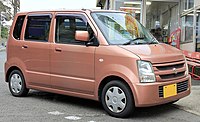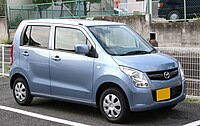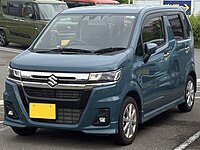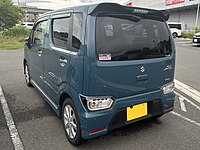Suzuki Wagon R
| Suzuki Wagon R | |
|---|---|
 Seventh generation Japanese Suzuki Wagon R | |
| Overview | |
| Manufacturer | Suzuki |
| Also called |
|
| Production | 1993–present |
| Assembly | Japan: Kosai, Shizuoka (Kosai Assembly Plant) |
| Body and chassis | |
| Class | Kei car |
| Body style | 4/5-door hatchback |
| Layout | |
| Related | |
The Suzuki Wagon R (Japanese: スズキ・ワゴンR, Suzuki Wagon'āru) is a kei car manufactured and marketed by Suzuki since 1993. The R in the name stands for Revolution and Relaxation.[1] The Wagon R uses a "tall wagon" configuration to maximize cabin space within kei car dimensional restrictions. The Wagon R is also sold by Mazda as the AZ-Wagon from 1994 to 2012 and as the Flair from 2012.
The Wagon R has been the best-selling kei car in Japan since 2003.[2] In 2008, Suzuki produced its three-millionth Wagon R.[3] Sales reached 5 million at the end of February 2010.
First generation (CT21S/CT51S/CV21S/CV51S; 1993)
| First generation | |
|---|---|
 First generation Wagon R 4-door (right-hand side) | |
| Overview | |
| Model code | CT21S/CT51S/CV21S/CV51S |
| Also called | Autozam AZ Wagon Mazda AZ Wagon |
| Production | September 1993 – October 1998 |
| Body and chassis | |
| Body style | 4/5-door hatchback |
| Powertrain | |
| Engine | |
| Transmission | 3-speed automatic 4-speed automatic 5-speed manual |
| Dimensions | |
| Wheelbase | 2,335 mm (91.9 in) |
| Length | 3,295 mm (129.7 in) |
| Width | 1,395 mm (54.9 in) |
| Height | 1,640–1,695 mm (64.6–66.7 in) |
| Curb weight | 720–820 kg (1,587–1,808 lb) |
The first generation Wagon R is 1,640 mm (64.6 in) high, or 255 mm (10.0 in) taller (170 mm (6.7 in) internally) than the JDM Suzuki Alto sold at the same time (which was exactly the same length and width, as dictated by the Kei class regulations). The R used the same 660 cc F6A three-cylinder engines as did the Alto and other Suzuki kei cars. The car was developed with low cost manufacturing in mind, with 70 percent parts commonality (by value) with the related Alto.[4]
Originally with two doors on the left side and a single door on the right (driver's) side, it was introduced at the 1993 Tokyo Motor Show.[5] In August 1996 the more common, symmetrical five-door setup became available and soon supplanted the earlier body style. For model year 1994, it won the Automotive Researchers' and Journalists' Conference Car of the Year award in Japan. The Wagon R was an unexpected runaway success, with 900,000 examples of the first generation sold in the Japanese home market - even outselling perennial bestseller Toyota Corolla on occasion.[4]
The rebadged Autozam AZ Wagon was presented in September 1994. Also using the F6A engine, this model was marketed through Mazda's Autozam network as part of an OEM deal.[6] After April 1997, this was sold as the "Mazda AZ Wagon."
A bigger first generation Wagon R, the Suzuki Wagon R+, was added in early 1997 and manufactured in Japan until the end of 2000 for the European market. The car featured a wider body and the K10A naturally aspirated engine with 996 cc and four-cylinders. The same Wagon R+ was also available with a 1.2-litre K12A engine.
-
Rear view (5-door)
-
Suzuki Wagon R (facelift)
-
1997 Mazda AZ Wagon
Second generation (MC11S/12S/21S/22S; 1998)
| Second generation | |
|---|---|
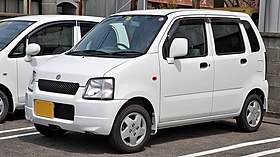 Second generation Suzuki Wagon R (pre-facelift) | |
| Overview | |
| Model code | MC11S/MC12S/MC21S/MC22S |
| Also called | Mazda AZ Wagon |
| Production | October 1998 – September 2003 |
| Body and chassis | |
| Body style | 4/5-door hatchback |
| Related | Maruti Suzuki Wagon R (first generation) |
| Powertrain | |
| Engine | |
| Transmission | 5-speed manual 3/4-speed automatic CVT |
| Dimensions | |
| Wheelbase | 2,360 mm (92.9 in) |
| Length | 3,395 mm (133.7 in) |
| Width | 1,475 mm (58.1 in) |
| Height | 1,640–1,685 mm (64.6–66.3 in) |
| Curb weight | 730–900 kg (1,609–1,984 lb) |
1998 saw the introduction of the second-generation Wagon R in Japan.
The larger (non-kei) Wagon R+ was replaced in 1999 - this was brought to Europe in 2000, with larger engines and was sold as the Suzuki Wagon R+. This larger version is also produced in Esztergom in Hungary by Magyar Suzuki and in Gurgaon, India by Maruti Suzuki. The Opel Agila is a badge engineered version of the Suzuki Wagon R-Wide, also introduced in summer 2000. This generation of Maruti Suzuki Wagon R in India was produced until 2010.
-
Rear view (4-door, pre-facelift)
-
Rear view (5-door, pre-facelift)
-
Suzuki Wagon R (facelift)
-
Suzuki Wagon R (facelift)
-
Mazda AZ Wagon (facelift)
-
Interior
Third generation (MH21S/MH22S; 2003)
| Third generation | |
|---|---|
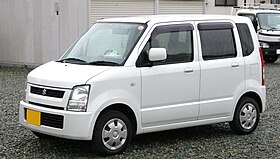 Suzuki Wagon R (pre-facelift) | |
| Overview | |
| Model code | MH21S/MH22S |
| Also called | Mazda AZ Wagon |
| Production | September 2003 – September 2008 |
| Body and chassis | |
| Body style | 5-door hatchback |
| Powertrain | |
| Engine | |
| Transmission | CVT 4-speed automatic 5-speed manual |
| Dimensions | |
| Wheelbase | 2,360 mm (92.9 in) |
| Length | 3,395 mm (133.7 in) |
| Width | 1,475 mm (58.1 in) |
| Height | 1,635–1,655 mm (64.4–65.2 in) |
| Curb weight | 810–940 kg (1,786–2,072 lb) |
The third generation Wagon R was launched in Japan in September 2003 for the Wagon R's tenth Anniversary, but now only as a 660 cc K6A-engined kei car - no oversized version (like the previous Wide and + versions) was developed. The third generation was then facelifted in September 2005 and replaced three years later.
The Stingray, first seen in February 2007, is a sportier version of the third generation Suzuki Wagon R. The name is an homage to the "Sting Ray" Fronte introduced in 1970. In addition to a more aggressive front end treatment, the Stingray also received clear taillights. Alloy wheels and an aero kit were also standard. The 660 cc engine was powered by a turbocharger, further enhancing the speed and acceleration. On average, the Stingray went from 0 km/h (0 mph) to 100 km/h (62 mph) in about 15 seconds.
-
Suzuki Wagon R (pre-facelift)
-
Suzuki Wagon R RR (pre-facelift)
-
Suzuki Wagon R RR (pre-facelift)
-
Suzuki Wagon R (facelift)
-
Suzuki Wagon R (facelift)
-
Suzuki Wagon R FT-S Limited (facelift)
-
Suzuki Wagon R Stingray
-
Suzuki Wagon R Stingray
-
Interior
-
Mazda AZ-Wagon
-
Mazda AZ-Wagon
-
Mazda AZ-Wagon Special
Fourth generation (MH23S; 2008)
| Fourth generation | |
|---|---|
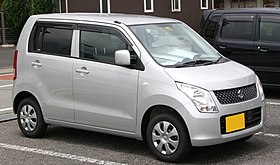 Fourth generation Suzuki Wagon R | |
| Overview | |
| Model code | MH23S |
| Also called | Mazda AZ Wagon |
| Production | September 2008 – November 2012 |
| Body and chassis | |
| Body style | 5-door hatchback |
| Related | Maruti Suzuki Wagon R (second generation) |
| Powertrain | |
| Engine | |
| Transmission | CVT 4-speed automatic 5-speed manual |
| Dimensions | |
| Wheelbase | 2,400 mm (94.5 in) |
| Length | 3,395 mm (133.7 in) |
| Width | 1,475 mm (58.1 in) |
| Height | 1,660–1,675 mm (65.4–65.9 in) |
| Curb weight | 800–930 kg (1,764–2,050 lb) |
The fourth generation Wagon R was launched in Japan in September 2008 along with the sportier Stingray, AZ Wagon and AZ Wagon Custom variant (the latter two manufactured for Mazda). Significant differences for the new generation include larger rear doors, which incorporate quarter glass, eliminating the need for a D-pillar arrangement. Powertrain options include naturally aspirated and turbocharged 660 cc K6A engines with the latter developing an output of 64 PS (47 kW), mated to a 4-speed automatic, a 5-speed manual transmission or a CVT. As with many other Japanese market models, customers can choose between front-wheel and all-wheel-drive versions.
-
Suzuki Wagon R FX Limited
-
Suzuki Wagon R FX-S Limited
-
Suzuki Wagon R FX Limited II
-
Suzuki Wagon R Stingray Limited
-
Suzuki Wagon R Stingray Limited
-
Interior
-
Mazda AZ-Wagon
-
Mazda AZ-Wagon
Fifth generation (MH34S/MH44S; 2012)
| Fifth generation | |
|---|---|
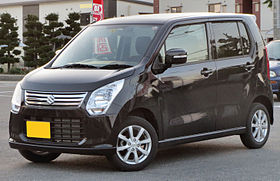 Suzuki Wagon R FX Limited (pre-facelift) | |
| Overview | |
| Model code | MH34S/MH44S |
| Also called | Mazda Flair |
| Production | September 2012 – January 2017 |
| Body and chassis | |
| Body style | 5-door hatchback |
| Powertrain | |
| Engine | |
| Electric motor | WA04A |
| Transmission | CVT 5-speed manual |
| Dimensions | |
| Wheelbase | 2,425 mm (95.5 in) |
| Length | 3,395 mm (133.7 in) |
| Width | 1,475 mm (58.1 in) |
| Height | 1,640–1,660 mm (64.6–65.4 in) |
| Curb weight | 780–870 kg (1,720–1,918 lb) |
The fifth generation Wagon R range was launched in Japan in September 2012 with an optional mild-hybrid system marketed as "ENE-CHARGE," and an energy-saving electric air conditioning system marketed as "ECO-COOL". With the R06A engine combined with an electric motor/generator and a lithium-ion battery, the ENE-CHARGE provides regenerative braking and power assist to the internal combustion engine and can also run certain electrical equipment, enabling mileage up to 28.8 km/L in Japan's JC08 driving cycle (67.8 mpg US, 3.5 L/100 km EU or 81.4 mpg UK).
For Mazda variants, the fifth generation Wagon R models are marketed as Mazda Flair and Stingray models are rebadged as Mazda Flair Custom Style. Both the Flair and the Flair Custom Style were launched in October 2012.[7]
-
Suzuki Wagon R FX Limited (pre-facelift)
-
Suzuki Wagon R Stingray T (pre-facelift)
-
Suzuki Wagon R Stingray T (pre-facelift)
-
Suzuki Wagon R FX (facelift)
-
Suzuki Wagon R FZ (facelift)
-
Suzuki Wagon R Stingray X (facelift)
-
Interior
-
"ENE-CHARGE" Battery
-
Mazda Flair XG
-
Mazda Flair Custom Style XT
Sixth generation (MH35S/55S/85S/95S; 2017)
| Sixth generation | |
|---|---|
 Suzuki Wagon R Hybrid FX (pre-facelift) | |
| Overview | |
| Model code | MH35S/55S/85S/95S |
| Also called | Mazda Flair |
| Production | January 2017 – present |
| Body and chassis | |
| Body style | 5-door hatchback |
| Platform | HEARTECT platform |
| Related | |
| Powertrain | |
| Engine | |
| Electric motor | WA05A WA05C |
| Transmission | CVT 5-speed manual |
| Dimensions | |
| Wheelbase | 2,460 mm (96.9 in) |
| Length | 3,395 mm (133.7 in) |
| Width | 1,475 mm (58.1 in) |
| Height | 1,650 mm (65.0 in) |
| Curb weight | 730–850 kg (1,609–1,874 lb) |
The sixth generation Wagon R range was launched in Japan on 1 February 2017. This iteration comes with an upgraded ISG (integrated starter generator) and increased capacity for the hybrid battery. Due to the improved battery and ISG, the Wagon R is capable of driving alone on its hybrid battery up to 10 seconds if the speed is kept under 13 km/h (8 mph).[8]
On 27 August 2021, a derivative model based on the sixth generation was created, called Smile.
The facelifted regular model was unveiled on 2 August 2022, along with the introduction of Custom Z model.[9]
-
Suzuki Wagon R Hybrid FX (pre-facelift)
-
Suzuki Wagon R Hybrid FZ (pre-facelift)
-
Suzuki Wagon R Stingray Hybrid X
-
Suzuki Wagon R Hybrid FX-S (facelift)
-
Suzuki Wagon R Custom Z Hybrid ZX
-
Suzuki Wagon R Custom Z Hybrid ZX
-
Interior
-
Mazda Flair Hybrid XG
Sales
| Year | Japan | ||
|---|---|---|---|
| Wagon R | |||
| Regular
Series[10] |
Custom Z[11] | Smile[12] | |
| 2001 | 238,273 | ||
| 2002 | 159,891 | ||
| 2003 | 177,123 | ||
| 2004 | 211,929 | ||
| 2005 | 236,702 | ||
| 2006 | 221,065 | ||
| 2007 | 226,715 | ||
| 2008 | 205,352 | ||
| 2009 | 201,530 | ||
| 2010 | 195,105 | ||
| 2011 | 160,440 | ||
| 2012 | 195,700 | ||
| 2013 | 186,090 | ||
| 2014 | 175,367 | ||
| 2015 | 108,107 | ||
| 2016 | 81,134 | ||
| 2017 | 114,710 | ||
| 2018 | 108,013 | ||
| 2019 | 90,046 | ||
| 2020 | 66,061 | ||
| 2021 | 68,970 | 30,675 | |
| 2022 | 82,213 | 35,718 | 82,213 |
| 2023 | 82,213 | 72,235 | 72,235 |
References
- ^ "Suzuki Car Name FAQ". Suzuki Japan. Retrieved 2019-07-10.
- ^ "Suzuki Wagon R 1st-Half Best-Selling Car for 5 Straight Years". Japan Corporate News Network KK. 6 October 2008. Archived from the original on 16 June 2010. Retrieved 14 December 2017.
- ^ Garrett, Jerry (2007-11-25). "Small Things in Good Packages". The New York Times. Retrieved 2010-12-04.
- ^ a b Sato, Mikio (2021-01-07). "スズキ・ワゴンR(初代)1993-1998 小さいけれどちゃちじゃない高くて広い新ジャンル" [Suzuki Wagon R (first generation) 1993-1998 A new genre of tall and spacious car that's small but not cheap]. MotorFan. Archived from the original on 2022-09-09.
- ^ Büschi, Hans-Ulrich, ed. (10 March 1994). Automobil Revue 1994 (in German and French). Vol. 89. Berne, Switzerland: Hallwag. pp. 519–520. ISBN 3-444-00584-9.
- ^ Büschi, Hans-Ulrich, ed. (6 March 1997). Automobil Revue 1997 (in German and French). Vol. 92. Berne, Switzerland: Hallwag. p. 348. ISBN 3-444-10479-0.
- ^ "【MAZDA】ニュース". Archived from the original on 11 November 2012. Retrieved 15 July 2015.
- ^ "New Wagon R Can Creep by Using Only Motor - HOME - Solar Power Plant Business". techon.nikkeibp.co.jp. Retrieved 2017-12-18.
- ^ "スズキ、軽乗用車「ワゴンR」、「ワゴンR スティングレー」を一部仕様変更し、新たに「ワゴンR カスタムZ」を設定して発売" [Suzuki partially changes the specifications of the mini passenger cars "Wagon R" and "Wagon R Stingray", and sets and releases the new "Wagon R Custom Z"] (Press release). Japan: Suzuki. 2022-08-02. Retrieved 2022-08-03.
- ^ "スズキ ワゴンR 新車販売台数/売れ行き(生産台数)と生産状況は?生産工場も - 株式会社アイディーインフォメーション" [What is the Suzuki Wagon R new car sales volume/sales (production volume) and production status? Production factory too - ID Information Co., Ltd.]. id-information.co.jp (in Japanese). Retrieved 2024-04-14.
- ^ "スズキ ワゴンRカスタムZ 新車販売台数/売れ行き(生産台数)と生産状況は?生産工場も - 株式会社アイディーインフォメーション" [Suzuki Wagon R Custom Z New car sales volume/sales (production volume) and production status? Production factory too - ID Information Co., Ltd.]. id-information.co.jp (in Japanese). Retrieved 2024-04-14.
- ^ "スズキ ワゴンRスマイル 新車販売台数/売れ行き(生産台数)と生産状況は?生産工場も - 株式会社アイディーインフォメーション" [Suzuki Wagon R Smile New car sales volume/sales (production volume) and production status? Production factory too - ID Information Co., Ltd.]. id-information.co.jp (in Japanese). Retrieved 2024-04-14.
External links
- Official website
- Official website (Mazda Flair)












